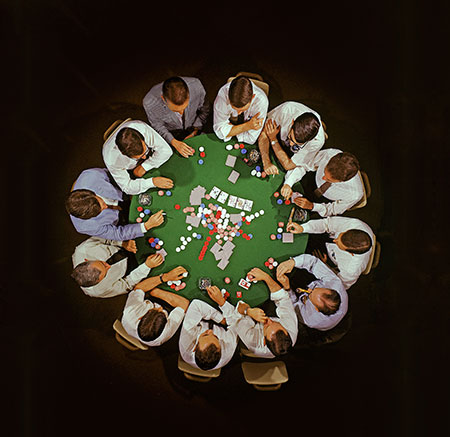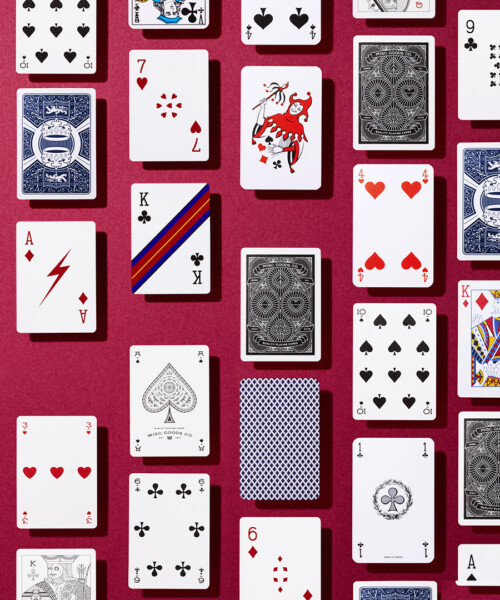You rarely get the call more than a day ahead, and that time in Beverly Hills was no exception. My friend Jerry, a fellow journalist and serious backgammon player, had been trying to get me into a hush-hush game of underground poker—high-class surroundings and real money on the table. Finally he succeeded.
On a beautiful September evening, the kind of balmy, ritzy atmosphere that only L.A. can deliver, I waited with Jerry in a parking lot in the shadow of Universal Studios. It was after 8 p.m. There was no one coming or going until a late-model van pulled up. This was our ride.
I’ve been playing poker since I was 18 and working for the Long Island Rail Road. We warmed up in the rail-yard shacks, playing cards and drinking coffee. The bets were rarely more than a few bucks. I kept playing when I became a New York City police officer—a lot of cops like poker. Once I started earning my living as an investigative reporter, I settled into a twice-a-month game, small stakes, at an athletic club in Manhattan.
I knew about the illegal, underground poker games. My buddies and I trade stories of fortunes won and lost at those tables, of crooks desperate enough to try to rob a mobbed-up game. Once in a while, it surfaces in the press—headlines erupt of major-league baseball stars and superhero-franchise actors getting their knuckles rapped for underground games. You don’t need to have seen Rounders to know that it can get rough for those who can’t make good on the bets—not for the people who show up in “Page Six” but for the mere mortals. I was curious about the whole scene, but truth be told I was a little concerned, too, as the van wove its way up through Beverly Hills. Turns out, the night held a surprise or two.
The game took place in an unoccupied but lavishly furnished mansion that a real estate broker had made available for the night, presumably for a cut of the action. Jerry introduced me to the game runner, the guy in charge. He told me no drinking too much, no drugs, no getting out of order, or I’d be taken back to my car. I agreed. The game runner also said card playing usually lasts until 5 a.m. We exchanged cash for poker chips and were ready to go. First came dinner: salads, appetizers, carved turkey or roast beef, a table of sushi and seafood. Excellent wine. Pretty women in short skirts waited at the tables.
Then it was time to sit down for no-limit Texas Hold ’Em, which has become the most addictive form of poker in America. Players were divided among five tables—mostly men, although there were a few young women, very well dressed. I wasn’t at the high buy-in table, where players dropped five figures on bets. But even so, with the swings of a no-limit game, a player’s wins or losses can easily reach $20,000 for the night. Jerry had told me that this game runner had a separate, even more exclusive game going, where the minimum buy-in was $25,000.
In the end, I came out ahead by just a small amount and was back in my own car well before 5 a.m. For me, an aboveboard regular game was enough scratch for the gambling itch. But I could see how the risk, the adrenaline rush, of underground poker could hook a player, and if you add a seven- or eight-figure bank account—whether it’s inherited wealth or accrued in Hollywood, in sports or on Wall Street—you have an incendiary combination.

Illegal poker was big news last year when the federal government took down a high-stakes game that had been running for three years in luxury townhouses and hotels in New York City, leading to 31 arrests, seven-figure forfeitures and jail time. According to the 84-page indictment, the group had been at the helm of “a high-stakes illegal gambling business run out of New York City and Los Angeles that catered primarily to multi-millionaire and billionaire clients.”
It’s pretty unusual to see people going to jail for underground gambling. In the state of New York it is legal to play poker for money but illegal for the organizers to profit. That’s called a “rake”—when the people running the game take a percentage of the pot for themselves or charge the players an hourly fee. Some game runners pull in a very fine rake. But still, this is not a crime police spend a lot of time on.
My sources say that the reason the punishments were so severe was that card-playing got mixed up with illegal sports betting and much worse. This past April federal prosecutors said the crime ring laundered more than $100 million. The number-one name on the indictment was Alimzhan Tokhtakhounov. To quote from the prosecutors’ description is to feel chills go up your spine:
“Alimzhan Tokhtakhounov, a.k.a. ‘Taiwanchik,’ a.k.a. ‘Alik,’ the defendant, who lived in the Russia Federation, was a vory v zakone, commonly referred to as Vor—a Russian term translated as ‘Thief-in-Law’ and referring to a member of a group of the highest-level criminal figures from the former Soviet Union who receives tribute from other criminals… Tokhtakhounov used his status as a Vor to resolve disputes with clients of the high-stakes illegal gambling operation with implicit and sometimes explicit threats of violence and economic harm.” To no one’s surprise, Tokhtakhounov remains outside the United States’ jurisdiction.
NEXT: “If you can’t spot the sucker in the first half hour at the table, then you are the sucker.”








































